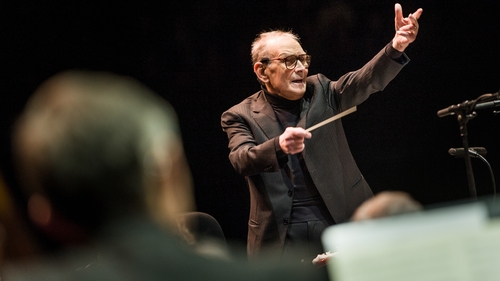So, in this post, I'd like to highlight the three most important "pillars" in film music. These are, in my view, the rubrics which all film music, "good" or "bad", can be explained with. These are:-
Leitmotif/"Theme"
Tone/"Emotion"
Arrangement/"Soundscape"
Please keep in mind that the way I use these words are not "technical". This is how I define each term:-
Leitmotif- The actual notes pressed on the keyboard/written on the stave. Basically, what most people consider to be a "theme tune".
Tone- The emotional undertones behind a composition. Completely subjective.
Arrangement- The sounds that the orchestrator and composer decide to use for the piece. Broadly divided into electronic, orchestral and choral, but I think those are far too vague to be legitimate distinctions.
Let's dissect some of my favourite tunes from cinema and see how each element comes into play, shall we?
Terminator
Composer: Brad Fiedel
The Big Gundown/La Resa dei Conti
Composer: Ennio Morricone
Another timeless Morricone masterpiece. There are two strong leitmotifs here, both of which appear throughout the movie constantly. One can be heard right at the beginning, the other is heard properly at 1:22. The soundscape is distinctly Morricone Western stuff, but he adds this incredible Native American chanting which definitely spice up the track. The feeling of fleeting freedom is prevalent throughout.
God of War (2018)
Composer: Bear McCreary
Just to throw some diversity in the mix (and to show that these principles have a universal quality to them), here's the God of War theme, composed by industry heavy weight Bear McCreary. Due to it being a video game, there are actually three leitmotifs, which play throughout the game. The most instantly recognisable one is most likely the one that plays at the start, the three note progression becoming iconic in its own right. The soundscape is varied, with heavy Nordic influences. The piece has a feeling of "epicness" behind it, as if it was made for a god. Of War. I'll see myself out.
The thing that makes these pieces (and most film music in general) is how composers twist and twirl these three pillars to fit each scene of the film. Let's start with the Terminator piece in the beginning.
The piece has various arrangements throughout the saga. The same leitmotif is kept, but the arrangement is switched up each time, in turn changing the tone. For instance, in Terminator: Genisys, Lorne Balfe makes a very Balfe style cover with "Terminated". Far more bombastic and intense than the Fiedel themes. In contrast, Fiedel himself makes a romance theme by slowing down the classic theme and playing it on a piano for the first film.
God of War, of course, has a ton of different arrangements of its main theme throughout the soundtrack. Here's the one that plays around with the theme the most creatively, in my opinion.
For this, let's look at another classic. Halloween. I probably don't need to post this theme, since I'm sure almost everyone knows the iconic John Carpenter keyboard progression by heart. It's almost as heavy a part of Western pop culture as the themes for The Good, The Bad, and The Ugly or Star Wars. But for the sake of being thorough:-
While I was slightly annoyed that the main theme of Maze Runner wasn't used enough in it's sequel, John Paesano, the under-rated genius that he is, managed to write a piece that, while not sharing a soundscape or even a leitmotif with the original, still evokes the same frantic spirit of the piece.
The last thing I want to talk about is how important definitive soundscapes are for film scores. This is why it frustrates me to no end when I see things like "Only Black Panther's African influenced music was memorable, it's orchestral stuff wasn't" when people refer to the score. A score includes its arrangement/soundscape. It matters. When Ramin Djwadi decides to do an acoustic guitar cover of his energetic theme for Pacific Rim, you notice. When a piano is used so prominently in Game of Thrones for the first time, you notice. When Steve Jablonsky decides to use a flute for Optimus Prime's theme in Bay's Transformers, you notice. When Hans Zimmer and Junkie XL (Tom Holkenberg) decide to use an electric cello (!) for Wonder Woman's theme in Batman V Superman, you notice. When John Williams decides to play the Imperial March on the harp of all things at the end of Star Wars Episode Six: Return of The Jedi, guess what? YOU NOTICE.
I've already touched upon it, but different arrangements and soundscapes are vital for diversity in film scores. Don't say "This score isn't legitimate because it's not orchestral blah-blah-blah". There's only one thing that can't be taken seriously, and it's your argument.
(All the pieces I mentioned in that paragraph, in order)
As a treat for you, I give you one final piece to assimilate. This piece is probably my favourite musical composition in any media, for one of the greatest pieces of art in entertainment history, a perfect storm of tones, arrangements and leitmotifs. I give you The Trio/Il Triello, composed by maestro Ennio Morricone. The finale piece for the 1966 film The Good, The Bad, and The Ugly, fully extended for your listening pleasure. Enjoy!
